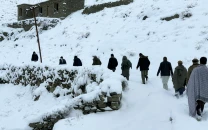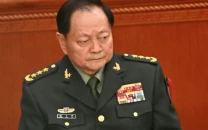Iran denies US claims of assassination plot against Trump
US Dept of Justice announces charges against Farhad Shakeri, Afghan national, conspiring with (IRGC) to kill Trump
1731151496-0/BeFunk_§_]-(63)1731151496-0-640x480.webp)
Iran has firmly rejected US allegations of a plot orchestrated by Tehran to assassinate former President Donald Trump, labeling the accusations "completely unfounded."
The US Department of Justice had previously announced charges against Farhad Shakeri, an Afghan national, for allegedly conspiring on behalf of Iran's Islamic Revolutionary Guard Corps (IRGC) to kill Trump.
The charges stemmed from Shakeri’s claims that he had been instructed by the IRGC in September 2024 to organize surveillance and plan the assassination of Trump before the US presidential election.
In a statement issued Saturday, Iranian Foreign Ministry spokesperson Esmail Baghaei dismissed the US claims as part of a "repulsive conspiracy" designed by Israel and other anti-Iranian factions to escalate tensions between Iran and the United States.
Baghaei emphasized that Iran would defend its rights using "legitimate and legal means" and rejected any involvement in the alleged plot. He also noted that similar accusations against Iran in the past had been equally baseless.
According to US authorities, Shakeri, who is believed to be in Iran, cooperated with law enforcement, providing details about the plan.
Shakeri reportedly told investigators that an IRGC official had pressured him to organize the assassination, indicating that the Iranian government was willing to fund the operation to the tune of a large sum of money.
Shakeri also claimed that the plan was delayed due to the expectation that Trump would lose the election, suggesting that it would be "easier" to carry out the plot after the election.
However, the Justice Department maintained that the plot, along with other alleged operations involving Iranian agents targeting US citizens, remains part of Iran’s broader strategy to intimidate or silence individuals opposed to its regime.
Shakeri, who has a criminal history in the US, was reportedly tasked by Iran to carry out additional murder-for-hire operations, including one targeting Masih Alinejad, a prominent Iranian-American journalist, and another involving Israeli tourists in Sri Lanka. Authorities also charged two men, Jonathan Loadholt and Carlisle Rivera, for their involvement in the plot against Alinejad.
The Justice Department’s revelation of the assassination plot comes as tensions between the US and Iran remain high, particularly after the 2020 US drone strike that killed General Qassem Soleimani, Iran’s top military commander.
The assassination of Soleimani, ordered by then-President Trump, marked a significant point of contention between the two nations, with Iranian officials vowing revenge.
Trump, who defeated Vice President Kamala Harris in the 2024 election, has not yet publicly commented on the alleged plot. However, a spokesperson for the president-elect said that Trump was aware of the assassination attempt but would remain undeterred in his political ambitions to "restore peace" globally.
The situation highlights ongoing concerns about Iran's willingness to target US citizens and officials, including dissidents and former leaders who have antagonized Tehran.
As the US investigation continues, the Iranian government has maintained that its overall policy, including its stance toward the US, remains unchanged regardless of the election results.
Tehran's long-standing opposition to Trump's policies, particularly his withdrawal from the Iran nuclear deal, is unlikely to shift under the incoming administration.



















COMMENTS
Comments are moderated and generally will be posted if they are on-topic and not abusive.
For more information, please see our Comments FAQ